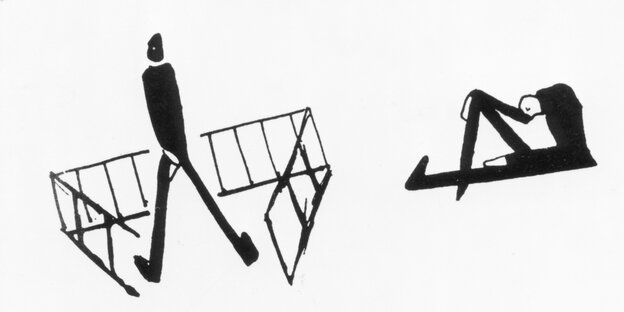The Messiah will come, but – typical of Franz Kafka – only on the very last day, when he will no longer be needed. A text analysis.
Drawings by Franz Kafka around 1905 Photo: Archive K. Wagenbach/AKG
‘Salvation’ is a big word. Given the countless catastrophes of our time, we no longer like to put it in our mouths. At most we forget our worries for a moment of happiness. But then everyday life begins again, making any broader hope for redemption seem futile.
Even more clearly, we have said goodbye to a messiah or messianic figures who promised this redemption. All too often they did not bring salvation, but death and destruction. Sometimes we still come to the sad lament that that couldn’t have been all. But we don’t know how things will change, how we can escape the seemingly never-ending catastrophe.
In this situation a sentence speaks of Franz Kafka for us, which he noted on December 4, 1917 in his so-called “Octave Book G”: “The Messiah will come only when he is no longer needed, he will come only after his arrival, he will not come on the last day.” day, but at the very end.” This five-part sentence is difficult to understand at first glance. Why does someone else come for Kafka when he is no longer needed, even though he has already come and of course a day late?
When Kafka wrote this sentence, he may not have been particularly relieved. On August 11, 1917, the writer suffered a hemorrhage, which was followed in September by the diagnosis of pulmonary tuberculosis. To recover, he then stayed at the Bohemian estate of his sister Ottilie “Ottla” Davidová. On December 25, 1917, Kafka informed Felice Bauer that he wanted to break off her second engagement. This time for good: in 1919 Bauer married Moritz Marasse, the partner of a private bank in Berlin.
Exegetical attempts
Accordingly, the “Oktaveheft G” revolves around the question of the cause and meaning of human suffering. In addition to thought fragments that laconically summarize his current situation (“in bed”), there are small pieces that can best be described as exegetical attempts. Day after day, Kafka returns to the stories from the Hebrew Bible and tries to gain insights from them.
For Kafka, the Messiah neither breaks into nor eliminates the misery of our world
The story of the fall of man seems to have particularly moved him. The writer explains this primal catastrophe several times. For Kafka, however, it counteracts this According to the popular interpretation, it does not represent a devil’s fate, but is the result of human weakness: “Because of impatience they were driven away and because of impatience they do not return.”
The first parents Adam and Eve wanted too much, too fast. According to Kafka, the expulsion from paradise is “invalid” for humans [sic!], life in the world is inevitable.” For him there is no messianic liberation, no Christian ‘restoration of paradise’, as, for example, the English poet John Milton promised him as the triumph of Jesus over the devil.
Things could change for the better
Yet even with Kafka there always seems to be hope that things could end well. At another point in his Octave booklet he compares the situation of people with travelers who have had an accident in a railway tunnel. From the scene of the accident they can no longer see the light of the tunnel entrance.
Meanwhile, the light at the end of the tunnel is so dim that they have to strain their eyes not to lose sight of it: “But all around us, in the confusion of the senses or in the maximum sensitivity of the senses, we many monsters and one delightful or exhausting kaleidoscopic game, depending on the mood and wounds of the individual.
The outside light that promises salvation is weak. But if people do their best and are not deceived, they can see it. This weak light, which is so difficult to grasp, also breaks through in Kafka’s life again and again.
Even before he thought about the Messiah, he wrote in his diary on July 20, 1916: ‘Have pity on me, I am sinful in every corner of my being. […] I am now close to the end, just at a time when everything could change for the better for me. Don’t push me to the lost.” The secular Jew Kafka becomes a praying man hoping for salvation.
The Messiah is not coming
Kafka’s five-part sentence on the Messiah has thus become more understandable, even if it cannot be completely resolved. On the contrary: the contradictions reflect its explanation. For Kafka, the Messiah neither breaks into nor eliminates the misery of our world.
We remain victims of accidents, our expulsion from paradise lasts forever. Instead, Kafka sees the Messiah as a faint light of hope shining from the end of the tunnel into our unhappy world. Only after the end of all things will His promise be fulfilled. Such a “weak messiah” can help us recognize the human inability to redeem while at the same time holding on to our own need for redemption.
